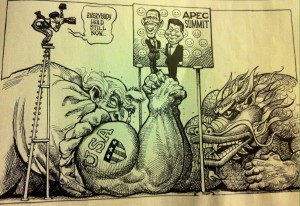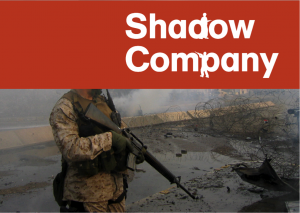Fighting for whatever it can get, America made serious concessions in its recent deal on carbon emissions with China. The United States of America is no longer the hegemony of the world, instead it is fighting for its right to even be considered one of the two leaders in a global bipolar system.
On November 11th, Presidents Xi Jinping and Barack Obama announced a new deal for both China and USA to reduce their carbon emissions. China has agreed its emissions will peak by 2030 (a higher year than hoped, but nonetheless an actual date as one has never previously been announced) and will also increase the non-fossil fuel percentage of its energy consumption by 20%. The USA, on the other hand, surrendered considerably more. As it has contributed a significantly greater share of the gases already in the atmosphere, and as such the USA accepted harsher cuts. Obama agreed to cut carbon emissions by 26 to 28% by 2025 – such reductions will require a doubling in the pace of cuts after 2020.
China appears to have conceded little. They agreed to targets that were already expected to be achieved with little to no effort. The USA on the other hand forfeited considerable amounts to gain the smallest of returns. The USA is considered by many to have hegemonic power; it is the most powerful state at the international level. Yet it seems to have completely surrendered to China. These were negotiations between the two largest producers of green house gases in the world. Yet only one side left having agreed to serious reductions. If the USA is has true hegemony, it will dictate international relations, it will be the deciding factor everyone bows down to. As such you would expect the USA to have forced China to surrender more, or, at worst, for the USA and China to make equal commitments. However this did not occur.
The USA committed considerably more than China. Though no one knows exactly what went down in the negotiations, the results imply that it was China who held the power. The USA is not a country who easily commits to reducing greenhouse gas emissions, especially not significant reductions. For them to agree to such reductions is to imply that China held the upper hand, forcing the USA into reductions in order for them to agree to the most basic of reductions on their own part. The relationship between China and the USA has become one where China has the power, the USA must bend its own back to gain anything from China. That said, given the USA did force China to agree to some reductions it cannot be said that China is a hegemony.
Essentially China agreed only to a date, one that is far enough into the future that scientists predicted their emissions would peak at this time no matter the governments position. Therefore they gave up very little, while the USA succumbed to the rise and caved in order to survive, to retain some power.
On the other hand, congress will do its best to prevent the USA from achieving what it has agreed to. As such the agreements can been seen as empty promises made by the USA in an attempt to get China to commit to reductions. Therefore the USA was not giving in, it was merely playing a specific part in a greater play to get China to succumb. However, such assumptions are to imply that China is weak and is not a player, that it cannot think of the motives behind American behaviour. This is too simplistic a thought, the Chinese government is smart and will only have given up some power (by agreeing to reductions) if it expects returns.
The United States of America can no longer be seen to be the sole hegemony. Instead China is rising, becoming more and more powerful, to the point were the USA must fall in order to try and retain the power that it does have. By surrendering concessions to China, the USA is able to retain its position as at least one half of a bipolar system.

